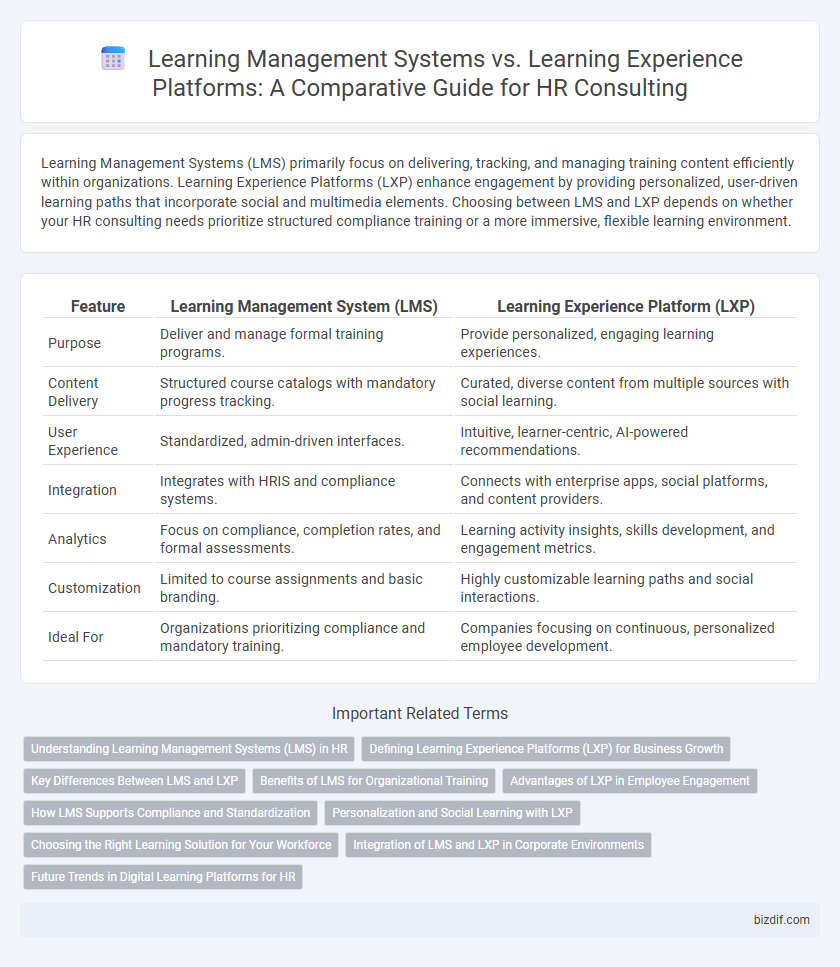Learning Management Systems (LMS) primarily focus on delivering, tracking, and managing training content efficiently within organizations. Learning Experience Platforms (LXP) enhance engagement by providing personalized, user-driven learning paths that incorporate social and multimedia elements. Choosing between LMS and LXP depends on whether your HR consulting needs prioritize structured compliance training or a more immersive, flexible learning environment.
Table of Comparison
| Feature | Learning Management System (LMS) | Learning Experience Platform (LXP) |
|---|---|---|
| Purpose | Deliver and manage formal training programs. | Provide personalized, engaging learning experiences. |
| Content Delivery | Structured course catalogs with mandatory progress tracking. | Curated, diverse content from multiple sources with social learning. |
| User Experience | Standardized, admin-driven interfaces. | Intuitive, learner-centric, AI-powered recommendations. |
| Integration | Integrates with HRIS and compliance systems. | Connects with enterprise apps, social platforms, and content providers. |
| Analytics | Focus on compliance, completion rates, and formal assessments. | Learning activity insights, skills development, and engagement metrics. |
| Customization | Limited to course assignments and basic branding. | Highly customizable learning paths and social interactions. |
| Ideal For | Organizations prioritizing compliance and mandatory training. | Companies focusing on continuous, personalized employee development. |
Understanding Learning Management Systems (LMS) in HR
Learning Management Systems (LMS) in HR serve as centralized platforms to deliver, track, and manage employee training programs efficiently. These systems optimize compliance training, skill development, and performance tracking through automated reporting and standardized content delivery. Integration with HRIS and talent management tools enhances workforce development and ensures measurable learning outcomes.
Defining Learning Experience Platforms (LXP) for Business Growth
Learning Experience Platforms (LXP) are advanced, user-centric digital solutions designed to deliver personalized learning paths by leveraging AI-driven content recommendations and social learning features. Unlike traditional Learning Management Systems (LMS), LXPs prioritize adaptive engagement, continuous skill development, and seamless integration with business objectives to enhance workforce productivity. Incorporating LXPs enables HR departments to foster a culture of continuous learning, accelerating talent growth and driving measurable business outcomes.
Key Differences Between LMS and LXP
Learning Management Systems (LMS) primarily focus on delivering and tracking formal training through structured courses and assessments, while Learning Experience Platforms (LXP) emphasize personalized, user-driven learning journeys supported by AI and social learning features. LMS platforms are typically designed for compliance training and administrative reporting, whereas LXPs prioritize engaging, on-demand content curation from diverse sources to enhance learner autonomy. Key differences include LMS's top-down content delivery versus LXP's bottom-up, learner-centered approach that adapts to individual skill development needs and preferences.
Benefits of LMS for Organizational Training
Learning Management Systems (LMS) provide HR consulting firms with a robust platform to streamline organizational training by centralizing course content, tracking learner progress, and ensuring compliance with industry standards. LMS enhances scalability and cost-efficiency, enabling consistent onboarding and upskilling across large or dispersed workforces. These systems also offer detailed analytics to measure training effectiveness and support data-driven decisions for continuous improvement.
Advantages of LXP in Employee Engagement
Learning Experience Platforms (LXP) offer personalized learning paths and interactive content that significantly enhance employee engagement compared to traditional Learning Management Systems (LMS). LXPs leverage AI-driven recommendations and social learning features, fostering collaboration and continuous skill development within the workforce. This tailored approach results in higher motivation, better retention of knowledge, and improved overall performance in HR-driven talent development programs.
How LMS Supports Compliance and Standardization
Learning Management Systems (LMS) excel in ensuring compliance and standardization by providing structured course delivery, automated tracking, and detailed reporting functionalities tailored for regulatory requirements. They enable HR teams to assign mandatory training, monitor completion rates, and generate audit-ready documentation, reducing risk of non-compliance. These capabilities make LMS essential tools for organizations needing consistent training adherence across multiple departments and locations.
Personalization and Social Learning with LXP
Learning Experience Platforms (LXPs) offer superior personalization by leveraging AI to tailor content to individual learning styles and career goals, enhancing learner engagement beyond the capabilities of traditional Learning Management Systems (LMS). LXPs prioritize social learning through integrated collaboration tools, peer feedback, and community-driven content, fostering a dynamic learning environment. This focus on personalized paths and interactive social features significantly improves knowledge retention and skill development in corporate training programs.
Choosing the Right Learning Solution for Your Workforce
Learning Management Systems (LMS) offer structured course delivery and compliance tracking essential for regulatory training, while Learning Experience Platforms (LXP) emphasize personalized, user-driven content discovery and social learning features that enhance engagement. Analyzing workforce needs, such as the necessity for formal certification versus collaborative skill development, guides choosing the right solution to optimize learning outcomes. Integrating analytics and user feedback capabilities ensures continuous improvement aligned with organizational goals and employee growth.
Integration of LMS and LXP in Corporate Environments
Integrating Learning Management Systems (LMS) and Learning Experience Platforms (LXP) in corporate environments enhances employee development by combining structured training with personalized learning paths. This integration allows HR teams to leverage LMS's robust tracking and compliance features alongside LXP's adaptive content and social learning capabilities, resulting in improved engagement and skill acquisition. Seamless data synchronization between LMS and LXP ensures comprehensive analytics, enabling tailored learning strategies that drive organizational performance and workforce agility.
Future Trends in Digital Learning Platforms for HR
Learning Experience Platforms (LXPs) are evolving beyond traditional Learning Management Systems (LMS) by emphasizing personalized, AI-driven content curation and social learning capabilities, which enhance employee engagement and skill development. Future trends in digital learning for HR highlight adaptive learning paths, seamless integration with performance management tools, and data analytics to measure training effectiveness and align learning with business goals. HR consulting increasingly prioritizes platforms that foster continuous learning environments through user-centric designs and real-time feedback mechanisms.
Learning Management Systems vs Learning Experience Platforms Infographic

 bizdif.com
bizdif.com